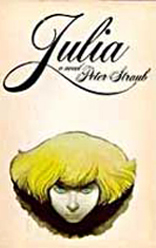

Julia
After the vapors of MARRIAGES and the portentous confusions of UNDER VENUS, what an immense improvement is seen herein! And without any undue immodesty whatsoever I may also say, what a tribute to the helpful influence an old friend such as myself can have upon a struggling, indeed flailing, writer like Mr. Straub, so prone to excess of every kind, to ignorance of his own limitations and the consequent inability to distinguish strengths from weaknesses, so unwilling or unable to restrain himself within the confines of his own small but satisfactory talents! I know, I am being quixotic, optimistic, selflessly loyal and generous with my time and insights to a degree others may not think justified, but as old-fashioned as it might seem in this cynical era, I imagine that friendship involves responsibility and shall continue to remind my old companion of the sandbox and swingset of the principles he once embraced under my fond tutelage and which enabled him to produce this book and the one that followed, by any rational standards his finest. Those principles are simplicity, straightforwardness, clarity and submission to the traditions of his chosen genre. The minute you hear of someone “transcending” his genre, you may be sure that he has gone astray.
Here we have an evil ghost, a haunted house, a woman in peril. Peter’s compulsion to insert into every narrative a ghastly secret hidden in the past first comes to the surface in this book, but it is kept under control and functions merely as an explanatory aspect of the plot. These time-honored elements are treated with an unintrusive originality – the evil reverent is a child, the house becomes overheated instead of cold, the heroine has repressed the memory of a hideous and terrifying deed — which in no way detracts from their familiarity. Our dutiful author understands that formulaic fiction is formulaic for an excellent reason, that the formula, beloved by its otherwise undemanding readers, is its only justification. My pal has worked out his grisly tale in advance, he sets it down with no more than a few unimportant digressions, he delivers the goods. Not least, the narrative begins at the beginning and travels along a straight line to end at the end. This is a book with which to while away a long flight or an afternoon at the beach. Once read, like all good entertainments it may be cheerfully forgotten. For an efficient work of genre fiction, no higher praise can be given. Three cheers? No, never, but two heartfelt huzzas are certainly in order, and that also is praise of the highest appropriate measure.
Now, I might nearly regret the instinctive generosity which prompted me to send the author a half-bottle of Bluebell’s Bubbles, our finest Ohio champagne and made from grapes grown at the lovely Bluebell vineyard in Chalmersville, only twenty miles from my dear Popham and our campus, for I fear that this gift and the accompanying card reading B+ is as good as it gets encouraged the delusional fantasy of “transcendence” soon to announce its destructive appearance upon the stage. Can it be a coincidence that “Bluebell” so closely resembles “Blue Rose?” (I am nothing if not relieved to have decided against sending this suggestible fellow a half-bottle of Ohio’s second-best and significantly less expensive champagne, Dark Vale Vineyard’s Black Blossom Brut, made at the other end of the state in Meegersville but available everywhere, even at some 7-11 locations.) However, I remain gratified by Peter’s obedience to first principles during the writing of at least one more book, his crowning achievement. That the celebratory demi-boutaille I shipped to his shabby little rented house in College Lane, Kentish Town, North London, helped keep his spirits aloft during the creation of IF YOU COULD SEE ME NOW is enough to dispel any second thoughts. As is his grateful note of thanks, which I hung on an office wall after paying the framer’s extortionate fee: Okay chum, whatever you say. / Here’s to blue bells, / yours, /Peter.

Putney Tyson Ridge